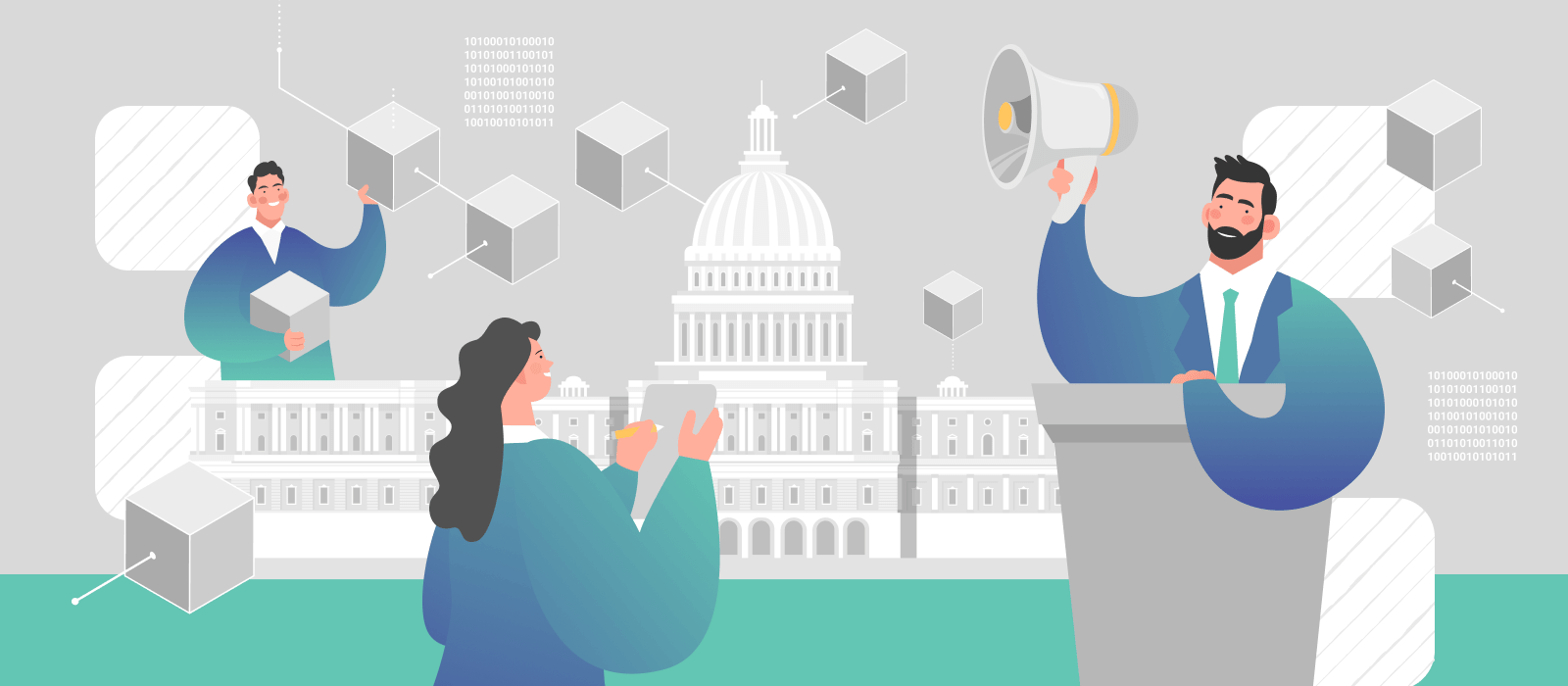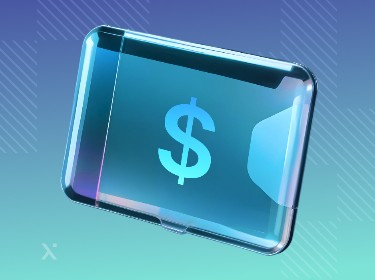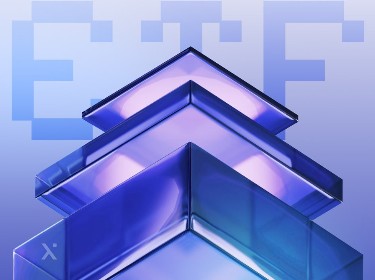Blockchain and government may seem like an incompatible combination at first glance. However, together they can address key issues such as lack of digitalization and transparency, privacy concerns, inefficiencies, and many more. But how?
In 2021, Deloitte conducted the Global Blockchain Survey that explored overall attitudes and investments in blockchain and digital assets. The company surveyed 1,280 senior executives and practitioners in 10 countries.
The survey found that 81% of global respondents believe that blockchain technology is broadly scalable and has achieved mainstream adoption and 73% of them shared that their organizations would lose their competitive advantage if they didn’t introduce digital assets and blockchain-based solutions.
Governments and public sector organizations are also among those who either already use blockchain or have big plans for this tech. They mainly leverage it to replace inefficient centralized systems that can be unsafe and quite expensive. Blockchain, on the other hand, allows for the creation of more secure, flexible, and cost-effective platforms.
Let’s find out more about why governments adopt blockchain, understand what benefits this technology brings, and explore real-life blockchain government use cases.
What is the role of blockchain for governments?
With blockchain, governments, businesses, and individuals share resources over a decentralized distributed ledger secured by using cryptography. This way blockchain helps protect sensitive citizen and government data.
What’s more, blockchain can help organizations tackle a number of existing problems in government processes, including the lack of digitalization, privacy issues, and widespread corruption.
For example, the World Economic Forum published a study on the blockchain-based public procurement system in which experts analyzed the feasibility of blockchain technology implementation in this area. They concluded that blockchain, with its cryptography and distributed consensus mechanisms, has properties that make it a promising technology capable of reducing corruption.
Some of these properties are continuous accounting, the immutability of recorded information, transaction data transparency, and auditability. Blockchain also implies the automated function of smart contracts and significantly reduces centralized authority and ownership of information within processes.
What are the potential benefits of blockchain in government?
A blockchain-based digital government can protect sensitive data while increasing trust and accountability. Some of the key benefits of implementing blockchain in government include:
- Secure storage of sensitive government and citizen data
- Prevention of data leakage risks
- Digitalization and reduction of labor-intensive processes
- Reduced costs associated with managing accountability
- Increased transparency and prevention of corruption cases
- Enhanced efficiency and automation of administrative processes
- Reduced costs by removing the need to turn to intermediary organizations and third parties
- Enhanced trust from citizens due to transparent transactions
What are the top 8 blockchain use cases in government?
![]()
There is a wide range of blockchain in government applications, from document tracking to e-voting. Let’s deep dive into 8 top use cases of blockchain in government.
#1 Blockchain as a tool to cut costs
Blockchain in government helps remove the need to turn to intermediary organizations and third parties, thus significantly reducing overall costs and providing opportunities to invest more in developing and improving social services.
Citizens would also feel better knowing that their tax money is spent on improving services instead of paying unnecessary costs for numerous intermediaries.
#2 Immutable record storage
![]()
Governments collect information for many different purposes, from statistics, border control, and public health to climate monitoring, social security, and law enforcement. The immutability of records provided by blockchain can help government organizations collect and store information without the risk of it being tampered with.
When people are sure that no one has intentionally changed the statistics, they will trust the data provided by the government.
Check out DocFlow – a blockchain-based DMS that digitizes the entire paperwork cycle and guarantees data security and authenticity
#3 Land title registries
License and registry processes involve piles of papers, plenty of middlemen, and, hence, costly and inefficient transactions. There is also a risk of fraud because it is difficult to verify documents and check the identity of the intermediary.
A blockchain-based land registration system will reduce the total number of intermediaries and help citizens save time and money. Moreover, they will be able to view verified information on real estate transactions and track all the changes.
For example, the Georgian government’s land registry department relies on blockchain as a land registry tool to track real estate transactions and land ownership. This way the government can ensure a greater transparency in land dealings while reducing the likelihood of corruption.
#4 Blockchain-powered e-voting
![]()
Regardless of the voting method – digital or paper-based – there is always a chance that someone will falsify or interfere with elections. The audit of election results is usually centralized and not transparent, and there are threats of cyberattacks both from within the country and abroad.
In addition to that, electronic voting machines and their maintenance, ballot printing, the organization, and the subsequent process of counting the results – all these things require a lot of money.
Blockchain can bring transparency into elections, improve security and vote verification, enable remote participation for citizens, and reduce the cost of running all stages of elections.
There is also good news for countries concerned about foreign involvement in elections. Blockchain can help prevent this, too. Since blockchain for the government implies immutability and increased security, no one can interfere with the voting results.
Looking for a voting solution for your company? Meet this blockchain app that speeds up the decision-making process
#5 Payroll tax collection
Smart contracts can be used to match tax data with income transactions and calculate tax and social security deductions, thus bringing more efficiency and streamlining the entire tax collection process.
A blockchain-based system can automatically transfer net salary and tax payments to recipients while ensuring enhanced security.
#6 Vaccination tracking
Governments can use blockchain to record vaccination data on distributed ledger. This way schools, insurance, and medical providers will be able to validate vaccinations quickly.
The technology allows governments to track the entire process of vaccine deployment as well as ensure better protection of vaccine safety and vaccination data.
#7 Validation of documents
Blockchain in government can help validate the documents of all citizens. It can store hash values of citizen documents, thus allowing governments to provide an attested electronic version of these documents anytime.
#8 Student loans tracking
Another prominent blockchain in government use cases includes the ability to efficiently track and manage student loans and grants. For example, smart contracts can be programmed to manage grant and loan applications. They can also track the compliance with terms and conditions. As a result, governments will have real-time loan data that is transparent and secure.
Blockchain for government: challenges
Despite numerous benefits, there are still a few issues for governments wanting to use blockchain. Some of the major challenges include:
- Scalability
When a decentralized network sees a sudden large influx of users, it becomes congested and slows down. As governments seek to interact and provide services to a wide audience, this issue is highly relevant to them.
Users of the two largest and most popular blockchains, Bitcoin and Ethereum, face this issue as well. Nevertheless, there is a way out: this challenge can be tackled with Layer 2 solutions or next-generation protocols such as Ethereum 2.0.
Meanwhile, Bitcoin and Ethereum are not the only blockchains in existence. Developers are trying to find solutions and make blockchains scalable, especially when building new platforms.
For example, the Flow blockchain launched in 2020 leverages its multi-node architecture to provide vertical scalability. The architecture of the nodes is built in such a way that the work is distributed among them. Thus, the blockchain is capable of processing a large number of transactions at a low cost and in a short period of time.
Solana is also a highly scalable blockchain whose transaction fees are very low. The Solana creators claim that the blockchain can process up to 65,000 transactions per second, and the average cost of a transaction is $0.00025.
Check out the article on Ethereum’s merge to PoS and find out how it affects the platform’s scalability
- Application and adaptation processes
Government agencies are obviously already using plenty of different programs and applications, and it may take some time to implement a new platform and integrate it with existing programs. Again, this is not an impossible task. If you partner with a professional blockchain team, experienced developers will customize the new application to your needs and fit it perfectly into the agency’s existing infrastructure.
- Security risks associated with losing private key
Blockchain security is one of its most prominent features. Thanks to powerful encryption, blockchain-based networks are generally highly resistant to hacking and fraud. However, if someone obtains your private key, they can access your sensitive data and agency information.
The recommendation on how to avoid this situation is simple – be extremely careful and never share or lose your private key.
- Lack of knowledge
For most governments, blockchain is still a new technology that will require a learning curve. Agencies can do the research themselves, or they can contact a trusted blockchain consulting company that will not only explain how blockchain works but also demonstrate use cases and real-world applications and offer a suitable solution.
Blockchain projects in government across the globe
![]()
You might be thinking, “This all sounds very cool, but is it really possible to implement government blockchain projects like this and get all these benefits?”
The answer is “YES”.
Currently, dozens of countries are either developing blockchain applications, or have implemented pilots, or have been successfully using blockchain on numerous projects for years. Let’s take a look at some of them.
USA
The U.S. Department of Health and Human Services (HHS) is running the Accelerate program – the first federal government blockchain-based program to get an authority-to-operate. In an effort to reduce procurement costs for the department, HHS has embarked on this project and has already achieved tangible results.
CIO Jose Arrieta said at the Digital Health CXO Tech Forum in February 2020,
“We negotiated a deal with a company and we’re going to save $30 million over five years. It’s about a 52.25% discount off of the rate that we’re currently paying. We’ll generate savings immediately in year one. That deal in and of itself more than pays for the investment that we’ve made in Accelerate.”
How did it work? The Accelerate neural network performed a cluster analysis of 10-year HHS contracts and identified price discrepancies in its portfolio. Later, the department used the results of this research to strike the deal.
The platform’s deep database is built on the Hyperledger Fabric blockchain framework and contains contract data from the department’s five procurement systems. The use of this platform enables automatic price reductions for the government as HHS staff can view how suppliers interact with the department, check time-stamped financial records, detect price discrepancies, and review all the information related to past contracts.
“We’re using [blockchain infrastructure] so that we can nudge and encourage decentralized behavior in the future. There’s a number of use cases that we see that could benefit the agency leveraging blockchain,” Mr. Arrieta added.
United Arab Emirates
The United Arab Emirates government is probably one of the biggest blockchain enthusiasts in the world that is currently implementing numerous blockchain projects.
For instance, in 2020, the Ministry of Health and Prevention (MoHAP), together with the Ministry of Presidential Affairs, Dubai Healthcare City, and other authorities, launched a blockchain-based medical platform. The platform will record and store data for healthcare and medical practitioners as well as pharmaceutical, government, and private institutions.
The blockchain-based trade finance platform launched by the Abu Dhabi Commercial Bank (ADCB) is another example of a blockchain project being implemented in the UAE. To realize this project, the bank started working with the Singapore-based dltledgers platform. In fact, ADCB became the first bank in the country to execute an end-to-end automated blockchain trade finance transaction.
What is the result? The private ADCB network is now able to provide end-to-end trade transparency throughout the entire transaction lifecycle with authenticated digitized documents at every stage.
It will take too long if we cover all blockchain projects in the UAE, so let’s take a look at just some of them:
- A blockchain-powered eCommerce platform launched by Dubai Customs
- The Dubai Immigration and Visas Department combines biometric authentication and blockchain to develop digital passports for seamless entry into Dubai airport
- The Dubai Multi Commodities Centre (DMCC) opens a Crypto Centre that will house companies developing crypto and blockchain technology
- Collaboration between IBM and Dubai’s Department of Economic Development resulting in the creation of a blockchain-based registry to share information about mainland and free zone registered companies and various aspects of their structure
Blockchain has already entered numerous industries in the United Arab Emirates and doesn’t seem to be stopping there.
Estonia
Estonia has applied blockchain in its e-government system to ensure the safety and security of digital data and take a big step towards a truly digital state. This ambitious project is simply called e-Estonia.
Currently, the Estonian government provides blockchain-based services in almost all areas: education, residency, healthcare, e-identity, mobile services, and others.
The country uses KSI Blockchain, designed by Estonia-based Guardtime. Thanks to KSI Blockchain implemented in Estonian government networks, historical records can’t be edited or rewritten by anyone.
Moreover, the authenticity of all recorded data can be mathematically proven. Thus, it is impossible to manipulate data and avoid punishment, no matter where you try to interfere with the system from – within government or even abroad.
Malta
Malta is also a country deeply involved in the adoption and use of blockchain technology. The government planned to turn the country into a “blockchain island” and they did so: according to the Times of Malta, since 2017, when the government first announced the creation of a “blockchain island”, about €60 billion in cryptocurrency and other virtual assets have passed through the country.
One of the projects implemented by the government, the Ministry for Education and Employment (MEDE), to be exact, was the adoption of the Blockcerts platform.
Using Blockcerts, educational institutions can create, issue, and verify diplomas, certificates, and other academic documents belonging to Maltese citizens. Those citizens, in their turn, will have control over the sharing of their academic credentials.
This solution helps reduce the risk of academic fraud and opens up opportunities for simpler, more convenient, and secure storage and sharing of academic information.
It’s worth mentioning that at the end of 2021, the Ministry for the Economy and Industry announced the launch of three new blockchain-based projects in the public sector. The first one will ensure the digitization and registration of official documents relating to industrial property rights in secure digital networks.
In the second project, products made in Gozo will be digitally labeled throughout the production cycle, and the entire process will be documented in the system. This will then allow consumers to scan the product’s QR code and receive confirmation that the item was indeed produced in Gozo.
The third project will see the strengthening of the Planning Authority through the DLT.
Switzerland
![]()
In November 2017, the government of the Swiss city of Zug decided to test digital identity issuance using the Ethereum blockchain. By the way, Zug is also known as “Crypto Valley” for its cryptocurrency acceptance and many blockchain-related start-ups.
Swiss users interact with the system via the uPort app. The protocol uses two smart contracts – a controller contract and an identity contract – to confirm the validity of the identity and protect data in case the user loses their mobile phone.
In addition to registering via the app, each applicant initially needs to visit the city hall to confirm that they are indeed a resident of the city. After the successful approval, their identity is publicly attested to the Ethereum blockchain.
Once all the steps are completed, the Zug digital ID owner can use the uPort app on their mobile phone to provide identity information.
“Thanks to blockchain-based digital identities, people are getting back control over their own data”, commented city clerk Martin Würmli.
Currently, the digital ID can be used for many municipal services, including voting.
South Korea
South Korea, famous for its technology and online services, couldn’t simply pass blockchain by. The South Korean government, for example, is actively developing the ICON platform. It is the country’s largest blockchain project, which aims to become a bridge between the online community and businesses in banking, healthcare, government, and many other industries.
There are three enterprise applications based on the ICON blockchain at the moment:
- Zzeung – for identity authentication and management
- BROOF – for digital certification and management
- VisitMe – for visitor check-in and management
In 2020, the Jeju Island government selected Zzeung for secure and reliable COVID-19 contact tracing. Since Jeju Island is one of the most popular tourist destinations in Korea, it was important to ensure the health and safety of tourists and local people while also protecting their personal data.
The South Korean commercial bank Shinhan Bank also chose Zzeung, but with a different goal: to launch the country’s first Know Your Customer (KYC) blockchain-based financial authentication service.
Final thoughts
Blockchain can help build citizens’ trust, prevent data breaches, reduce corruption, and cut government spending. The money saved – citizens’ taxes – can be better used, for example, to improve services and invest in medical care, education, etc.
If your government agency is considering implementing blockchain or would simply like to know more about the technology, its use cases, and real-world applications, don’t hesitate to contact our enterprise blockchain development team. With over 50 enterprise blockchain solutions built, PixelPlex and blockchain are talking to each other on a first-name basis.
Our blockchain development experts will not only explain blockchain technology but also provide a feasibility study for using blockchain in your future projects and offer you the solution that best suits your agency’s needs.




